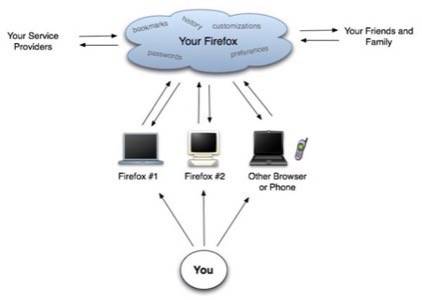Mozilla today announced Weave, a new web platform that will store users’ browser metadata in a cloud environment for access anywhere. Weave is a “framework for services integration” that will, according to Mozilla, “focus on finding ways to enhance the Firefox user experience, increase user control over personal information, and provide new opportunities for developers to build innovative online experiences.”

Weave is currently available for beta users of Firefox 3 here. The basic idea is that browser metadata (things stored in your Firefox profile like bookmarks, history, RSS feeds, usernames and passwords, etc.) is pushed into the cloud and stored on Mozilla’s servers. The data is available to users from wherever they get online and users can share information with friends, family, or third parties while retaining control over how, when, and if the info is shared.
Mozilla is launching the service with a set of organizing principles to reassure users of their privacy and the intentions of the project. Those principles are reprinted below and in my mind will make it easier for consumers to trust Mozilla with their data:
Mozilla will:
- provide a basic set of optional Mozilla-hosted online services
- ensure that it is easy for people to set up their own services with freely available open standards-based tools
- provide users with the ability to fully control and customize their online experience, including whether and how their data should be shared with their family, their friends, and third-parties
- respect individual privacy (e.g. client-side encryption by default with the ability to delegate access rights)
- leverage existing open standards and propose new ones as needed
- build a extensible architecture like Firefox
Image via Mozilla Labs.

Mozilla presented some initial use cases for Weave including data backup, using Firefox from anywhere (or on mobile devices) using personalized info (like your history and bookmarks), and collaborative bookmarking. The next version of Weave, planned for 2008, will include a set of APIs for developers to build additional services that can access and (presumably) store metadata.
Weave and Data Portability
The first thing I thought of when reading about Weave was the project being undertaken by the folks at DataPortability.org to create a standardized set of protocols for sharing and remixing our data. It seems to me that Weave has many of the same goals: increased control over personal information, anywhere access to that information, easier third party access to information, etc.
As Dan Farber points out, Mozilla has 15-20 projects in development ranging in areas from calendars to email to instant messaging. Weave could potentially hook into all of these in the future and begin to draw together the pieces of the mythical web OS.
But by supporting things like OpenID and OAuth, could Weave potentially act as a hub and delegator for all of our online activities and personal information? That already seems to be a goal of the project, and Weave appears to operate with many of the same ethical principles as the DataPortability.org project (i.e., users have control of their information and how it is shared), and it further seems to me that something like OAuth could make Weave even more secure for users. Support for the data portability stack would, in my opinion, make Weave a more powerful framework and help define standards for data portability that would benefit all users in the long run.
According to a statement in the comments of a blog post by Mozilla Labs VP and General Manager Chris Beard, Mozilla is open to working with the data portability stack. “We’ve definitely been following openid, oath, etc. very closely as well,” he wrote. “The focus first should be on what can and should the browser do as an intelligent agent on behalf of the user and then we can determine how best to get there from here.”
What do you think of Mozilla Weave? What would you like to see developers build using the forthcoming Weave API?









